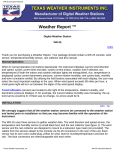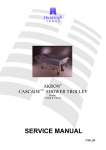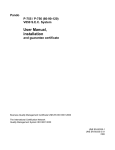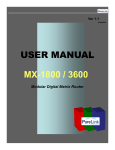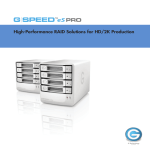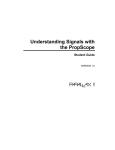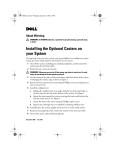Download Texas Instruments WRL-10 User's Manual
Transcript
WRL Weather Report Logger The WRL senses wind, temperature, humidity, barometric pressure, rainfall and time, then outputs this data via a RS-232 interface to other devices. The WRL can be programmed to output current weather, along with minimum and maximum conditions for the day. The WRL keeps track of two different minimum and maximum values and up to 8000 lines of data (depending on memory size) in its non-volatile memory clock. The WRL-10 has 2K of memory and will retain approximately 30 lines of data. The WRL-32 has 32K of memory and will retain approxomately 2000 lines of data. The WRL-128 has 128K of memory and retains about 8000 lines of data. All functions of the WRL can be controlled through its RS232 interface. Included with the standard WRL system is a wind direction and speed sensor, a pagoda mounted temperature/humidity sensor, a rain collector and a pressure sensor installed in the display console. Options include solar radiation, lightning and leaf wettness sensors. Normal Operation When in normal operation (no buttons depressed) the instrument displays current wind direction and speed, cycles current time and date, cycles current indoor, outdoor temperature. In addition, if selected, the optional solar radiation or aux temperature is displayed when both the indoor and outdoor indicator lights are extinguished. The unit also cycles current barometric pressure, current relative humidity, and cycles daily, monthly and term cumulative rainfall. By utilizing the hold buttons associated with each display, the user may select the most important readings to the user. During wind speeds in excess of 99 miles per hour a small light turns on between the digits of the wind speed display. Trend indicators (arrows) are located to the right of the temperature, relative humidity, and barometric pressure displays. If, for example, the current relative humidity is increasing then the up trend arrow appears on. If there is no change in humidity, then the arrow would not appear. Installation The standard WRL uses three sensors to gather weather data. The wind direction and speed sensor, the temperature and humidity pagoda and the rain collector (see figure 1). All are designed to mount to a television type mast (not provided). The cables from the sensors go into a junction box, where they connect via RJ45’s to two multi-wire cables (intermediates) that are routed into the building and attached to the console. All cables are color-coded. The yellow wind sensor cable plugs into the yellow RJ45 connector in the junction box. The yellow intermediate (wind) also plugs into a yellow RJ45 connector in the junction box. Plug the temperature/humidity pagoda and the rain collector (both colored blue) and the blue intermediate into the blue RJ45 connectors in the junction box. You may place any blue cable into any blue RJ45 connector, the order does not matter. Texas Weather Instruments, Inc. 1 WRL Instruction Manual There is lightning protection (transient voltage suppressers) built into the junction box. It is very important that the mast is grounded or else the transient voltage suppressers will not protect your instrument. The junction box picks up earth ground through the hose clamps mounting the box. We suggest that you install a copper-grounding rod (available at Radio Shack) and run the heavy gauge wire directly behind the hose clamps of the junction box. This arrangement will ground your mast and your junction box. C A U T I O N !! :BE EXTREMELY CAREFUL NOT TO TOUCH ANY HIGH POWER LINES DURING INSTALLATION OF THE VARIOUS SENSORS!!! The wind direction and speed sensor is normally mounted on television type antenna masts (see Figure 1). For best results the wind sensor should be mounted twenty feet above the roof of the building. Higher installation yelds more accurate readings. There is one yellow cable that must be strung from the wind sensor to the console via the junction box. The wind direction sensor is calibrated at the factory and should be installed with the wind sensor arm pointed to the North. The wind sensor can be mounted in any direction and recalibrated via the WRL console, but it is more convenient to use the precalibrated North reference. If calibration is necessary after the unit is already mounted, pick a calm day or immobilize the wind vane by hand and use calibraton mode to make these changes. The outside temperature/humidity pagoda should be mounted about two feet under the wind sensor. Again, we suggest a twenty-foot mast for commercial installations to overcome the artificially high readings generated by a hot roof. Plug the temperature/humidity pagoda cable into the blue RJ45 connector in the junction box. The rain collector is normally mounted on the mast. It should be mounted as low as possible both to reduce windage and to limit movement of the mast, which can cause false readings. The collector should be mounted in a manner that allows rain to enter the Texas Weather Instruments, Inc. 2 WRL Instruction Manual collector unencumbered by surrounding obstacles. Use a bubble level to make sure that the collector is perfectly level with the ground. Failure to level the collector will cause inaccurate rainfall readings. The rain collector has one blue cable, which must be connected to the console via the junction box. Mount the junction box under the rain collector using the hose clamps that are installed on the box (see figure 1)and remove the front cover of the junction box. Next insert the connectors from the sensors and the cables from the console through the hole in the bottom of the junction box and then out the front of the box. Plug all the yellow connectors into the yellow RJ45 connectors and all the blue connectors into the blue RJ-45 connectors and then pull the excess cable out of the junction box (j-box). Be sure and replace the rubber gasket on the junction box so that it can remain watertight. Plug the yellow intermediate cable (wind) into the yellow pigtail exiting the back of the console. Do the same for the blue cable (temp/humidity & rain). Next, plug in the serial cable into the connector in the rear of the console and the proper serial port of your computer. If you are supplying your own serial cable, be sure that either you have a null modem adapter attached to the cable or that the cable is a null modem cable. The cable supplied with the WRL will have four connectors or will be marked with a green color on one of the cable connectors. Plug the wall transformer into a 120V wall socket to power up the unit. The optional solar sensor must be pointed to the South and must be free of shadows created by the other sensors (Near the top of the mast is normally the best). Take care that the sensor is perfectly level. The solar sensor has one red cable. Run the red solar sensor cable to the junction box and plug it in to the red connector in the jbox. Run the red intermediate cable to the console and plug it into the j-box. Texas Weather Instruments, Inc. 3 WRL Instruction Manual OPERATION Report Hold Date/Time Windchill Temperature Hold Comfort Barometer/Humidity Hold Average Last Hold Rainfall Select Clear Min Max Scale Weather Report FUNCTION KEYS Select The select key, when depressed at exactly the same time as the report key, puts the unit into time/date and lunar/tide cycle set mode. When the select and scale keys are depressed at exactly the same time, the unit enters the calibration set mode. When the select and average keys are pressed at the same time, the unit enters the printer set mode. When select and last are depressed at exactly the same time the instrument enters rainfall history set. When select and time hold are pressed at exactly the same time the instrument enters logging mode. When the select key is held for 10 seconds, the unit will enter or exit protect mode. Once the instrument is in its respective mode, the select key is used to step through the different functions. If the unit is in protect mode, all of these functions are disabled Clear The clear key, when depressed, causes the unit to display the date and time of the last memory clear. Pressing clear and minimum at the same time clears the unit's memory. Pressing clear and maximum at the same time also clears the unit's memory. Pressing clear and last rain clears the term rainfall. Minimum The minimum key, when repeatedly depressed, steps through wind-speed/winddirection, temperature, barometric pressure, humidity and rainfall rate, displaying the minimum reading of each of these functions since the last time the unit memory was Texas Weather Instruments, Inc. 4 WRL Instruction Manual cleared. In addition to the minimum reading, the unit displays the date and time of its occurrence. The date and time display must not be on hold in order to display both date and time. Maximum The maximum key functions the same as the minimum key, but with maximum readings. Scale The scale key changes the displays from reading in English values to those of Metric values. The inch light near the rain display is on when the instrument is in English mode. The English to Metric equivalents are miles per hour or Knots to Kilometers per hour, Fahrenheit to Celsius, Inches of Mercury to Millibars, Inches of rain to Centimeters of rain. Pressing the select and scale key at the same time puts the unit into calibration mode. If the unit is in protect mode, this function is disabled. Report Pressing the report key sends current data to the serial port. The report key, when depressed at the same time as the select key, puts the unit into its time setting function. Pressing the report key while in logging mode will send all data in memory from the currently displayed record forward to the RS-232 port. Hold The hold key when depressed (toggled on) stops the cycling between two different parameters on the same display. Windchill The Windchill key, when depressed, calculates and displays, using wind speed and temperature, a factor that represents how cold the temperature and wind feel to bare flesh. Pressing the windchill and the comfort key at the same time will display the dew point. Comfort The comfort key, when depressed, calculates and displays, using humidity and temperature, a factor which represents how warm the temperature feels. Last The last key, when depressed, displays the time and date of the last rainfall and its rainfall rate. When depressed at the same time as the clear key, the instrument clears the term rainfall register. When last is pressed at the same time as select, the unit enters into rainfall history mode. Average When toggled on, the dot below the Av light (near the wind speed display), indicates that the unit is in wind averaging mode. When in wind averaging mode, the instrument displays the previous minute's average wind direction and speed. When depressing the average key and the select key at the same time, the unit enters into the printer set mode. Texas Weather Instruments, Inc. 5 WRL Instruction Manual ¸Time Setting Mode: Press select and report at the same time, and the last two digits of the year displays (i.e., 90 = 1990). Press the maximum button to advance the year and the minimum button to retard the year. If the unit is in protect mode this function is disabled. . Report Time/Date Hold Windchill Temperature 90 Hold Comfort Barometer/Humidity Hold Last Rainfall Select Clear Hold Minimum Maximum Scale WEATHER REPORT Press select a again and the month will be displayed (i.e., 1 = Jan. and 12 = Dec.). Press the maximum and minimum key to set the month. Report Hold 12 - - AM PM Press select a third time, and the day of the month (1-31) digits light. Press the maximum to advance the date and minimum to retard the date. Report Hold - - .25 Texas Weather Instruments, Inc. AM PM 6 WRL Instruction Manual Press select a fourth time, and the day of the week is displayed (1 = Sunday, 2 = Monday, 3 = Tuesday, 4 = Wednesday, 5 = Thursday, 6 = Friday, and 7 = Saturday. Press the maximum button to advance the day of the week and minimum to retard. Report Hold 04 AM PM Press select a fifth time (note the colon between the hours and minutes), and the unit will display the time in military hour style. Press the maximum button to advance the hour or minimum to retard the hour. Report Hold 23 :- - AM PM Press select a sixth time (note the colon between the hours and minutes), and the unit will display minutes. Press the maximum or minimum buttons. Report Hold - - .42 AM PM Press select a seventh time (note only the right two digits); the unit will display seconds. Press the maximum or minimum buttons to set the seconds. (note: the seconds is updated on the display only when the maximum or minimum button is being depressed). Report Hold 22 AM PM Press select an eighth time (Note: a single dot at the bottom separates the hour and minute); the lunar/tide clock will display the number of hours in a cycle. Press the maximum or minimum buttons to set the hours of the cycle (explained in the Lunar Tide section). Report Hold 12.- - Texas Weather Instruments, Inc. AM PM 7 WRL Instruction Manual Press select a ninth time (Note: the single dot remains at the bottom, separating the hour and minute); the lunar/tide clock will display the minutes of the cycle. Press the maximum or minimum buttons to set the minutes of the cycle. Report Hold - -.51 AM PM Press select a tenth time (Note: the single dot is now located at the top, between the hour and minute); the peak of the cycle hour (usually high tide) will be displayed. Change as desired. Report Hold 09 ' - - AM PM Press select an eleventh time (Note: the single dot remains at the top between the hour and minute), and the minutes of the peak hour will be displayed. Change as desired. Report Hold - -' 31 AM PM Press select a twelfth time and the unit will return to normal display mode. Calibration mode See the calibration reference section for other details. Calibration Method Press select and scale at the same time, and the unit enters calibration mode. The unit first displays the Solar radiation calibration factor. If necessary, press the maximum or minimum key to enter the proper factor. This factor is located on the back of the instrument. When the unit is in protect mode, this function is disabled. Texas Weather Instruments, Inc. 8 WRL Instruction Manual Report Time/Date Hold Windchill Temperature 76 Hold Comfort Barometer/Humidity Hold Last Rainfall Select Clear Hold Minimum Maximum Scale W EATHER REPORT Press select a second time; the unit displays the indoor temperature. Press the maximum or minimum key to enter the actual temperature. Windchill Indoor Hold O utdoor - -.73 Press select a third time - the unit displays the outdoor temperature. Press the maximum or minimum key to enter the actual temperature. Windchill Indoor Hold O utdoor - -.28 Press select a fourth time; the unit displays barometric pressure. Press the maximum or minimum key to enter the actual barometric pressure. Comfort Hold 29 .9 2 Texas Weather Instruments, Inc. 9 WRL Instruction Manual Press select a fifth time; the unit displays 0, 1, 2, or 3 in the rainfall window. 2 is the normal display. Press the maximum or minimum key to enter the proper number (see calibration reference for more information). Last D aily Hold Monthly 2 IInch Term Press select a sixth time; the unit will display a reading ranging from .01 to .1 in the rainfall window. Press the maximum or minimum button to enter the proper number which is usually .01. Last D aily Hold Monthly .01 IInch Term Press select a seventh time - the unit displays wind direction. Press the maximum or minimum key to enter the actual wind direction. Press select an eighth time - the unit will return to the normal display mode. Humidity Sensor Calibration This function is only used if a new humidity sensor is installed. Press select and humidity hold to enter this mode. The first number to appear is the voltage at 0% humidity that the sensor outputs. Press select again and a second number will appear. This larger number is the voltage that the sensor outputs at 75% humidity. The humidity calibration numbers are found on the humidity/temperature sensor and on the back of the instrument console. These calibration numbers are supplied to us by the manufacturer of the sensor and are normally not changed. If the unit is in protect mode this function is disabled. Texas Weather Instruments, Inc. 10 WRL Instruction Manual Logging Mode Press select and time hold at the same time to enter logging mode (note that all the trend indicators are on when in this mode). Report Time/Date 10:23 Hold Windchill Temperature 76 Hold . 29 .9 2 Comfort Barometer/Humidity Hold Last Rainfall Select Clear 2.3 5 Hold Minimum Maximum Scale W EATHER REPORT Logging mode allows the user to view previously logged data via the display. (You can only enter logging mode if there is data in the logging memory). You may choose what interval of time you would like the data saved through the print set routine. Once in logging mode, press the minimum or maximum key to move forward or backward through the data. The date and time of the line of date will be displayed in the time/date window. If you have a printer connected to the display, pressing the report key from within the logging mode, directs the WRL to output data from the data displayed point forward. Press the select button again to exit logging mode. The WRL will start writing over the oldest data records in memory with new data when the capacity of the memory is achieved. Print Set Mode There are two settings that will affect the deposition of data. The first, report interval, determines how often the WRL will automatically dump data to the RS-232 port. The Texas Weather Instruments, Inc. 11 WRL Instruction Manual second, log interval, determines how often the unit saves data to its internal memory. If the unit is in protect mode this function is disabled. Pressing select and average at the same time puts the unit into print set mode. The unit first displays the report interval in number of hours between lines of printed information. Press the maximum and minimum keys to change display. Pressing select a second time displays the number of minutes between lines of information. Press the maximum and minimum keys to change the display. Press select a third time, and the minimum/maximum and form feed options 0 through 7 may be selected as illustrated in the table below: SETTINGMIN/MAX 0 1 2 3 4 5 6 7 FORM FEED OFF ON OFF ON OFF ON OFF ON OFF OFF OFF ON OFF OFF OFF ON RAIN RATE OFF OFF OFF OFF ON ON ON ON When rain rate is off, term rain is substituted. Press select a fourth time to select the baud rate of the serial output. Press the maximum and minimum keys to change the display. Press select a fifth time to select log interval hours. The log interval tells the Weather Report to send data to the internal memory and at which interval to do so. Press the maximum or minimum to change the display. Press select a sixth time to select the log interval minutes. Press the maximum or minimum to change the display. Press select a seventh time, and a number between 0 and 255 appears in the pressure/humidity window. This number represents output options. Enter the proper option number by pressing the maximum or the minimum key. The output options control the selection of such things as AM PM, wind speed knots, auxiliary display and average wind speed output. (Look at the first item in the reference section called control options for more information). Press select a eighth time and the unit will return to a normal display. Texas Weather Instruments, Inc. 12 WRL Instruction Manual Protect Mode When the unit is in protect mode, scale, time setting, calibration and print set modes are disabled. To enter or exit protect mode, press the select key for more than 10 seconds. The WRL will display PPPP in the time and date window when the select key is depressed while in protect mode. Daylight Savings Mode When enabled through the print set routine, the unit will automatically adjust the time to correspond with daylight savings time. When daylight savings mode is enabled, two decimal points will be displayed in the time/date window when the select key is pressed. Operation via RS-232 The WRL via its RS-232 interface can communicate with computers running either the TWICAL program, standard computer communication programs like Windows Hyperterm or dedicated weather applications like WeatherView32. The WRL responds to the following ASCII characters sent by computers, with ASCII space delimited text. Command Characters V- Firmware version number S- Firmware Serial# I- Unit ID number C- Unit responds with a daily minimum and maximum of all parameters, then clears. The rainfall rate is present rather than term rain. Sample MIN 07/24/90 SW 00MPH 000F 067F 067F 054% 30.00" 00.19"D 01.38"M 00.00"R MAX 07/24/90 SSE 25MPH 052F 071F 092F 099% 30.06" 00.19"D 01.38"M 00.72"R c- Unit responds with a daily minimum and maximum of all parameters, then clears. The term rain is present rather than rainfall rate. (Note: use of the either c command will clear the logged min/max.) Sample MIN 07/24/90 SW 00MPH 000F 067F 067F 054% 30.00" 00.19"D 01.38"M 00.00"T MAX 07/24/90 SSE 25MPH 052F 071F 092F 099% 30.06" 00.19"D 01.38"M 00.72"T The minimum and maximum associated with the C command is cleared automatically at midnight D- Unit responds in an identical manner as the C command but does not clear the system memory. Texas Weather Instruments, Inc. 13 WRL Instruction Manual d- Unit responds in an identical manner as the c command but does not clear the system memory E or e- Unit responds with minimum and maximums along with date and time of occurrence. This uses the same buffer as the c and d command. M- Unit responds with all term minimums and maximums with the date and time of their occurrence, then clears. m- Unit responds in an identical manner as with the M command but does not clear the system memory. Sample TA 10:33 038F TA 09:32 056 F TI 04:15 075F TI 15:03 080 F TO 10:33 038F TO 16:10 056 F RH 15:44 033% RH 01:40 060 % BP 16:11 29.57” BP 10:20 30.15" RD 04/29 00:00“ RT 01:00" RM 03.32“ WS 00:00 000 MPH 048 The system has two completely separate memory buffers (C and M commands). C is cleared every midnight. M is only cleared by pressing the clear and min buttons on the display or sending an upper case M via a computer. R- Unit responds with current conditions. The rainfall rate is present rather than the term rain. (Note: in 30.04R the “R” denotes rising pressure) Sample 5:15 07/24/90 SSE 04MPH 052F 069F 078F 099% 30.04R 00.19"D 01.38"M 11.78"T r- Unit responds with current conditions. The term rain is present rather than the rainfall rate. (Note: in 30.04F the “F” denotes falling pressure, a “S” character denotes steady pressure.) Sample 5:15 07/24/90 SSE 04MPH 052F 069F 078F 099% 30.04F 00.19"D 01.38"M 00.72"R K- Unit responds with current calculated values for dew point, Windchill and heat index. Q- Unit response with hi resolution time, wind, temperature and pressure (in hi-res models only). Sample 96/01/15 09:21:44 SSE 004.3MPH 052.6F 069.2F 078.5F 069% 30.041F 002.19" The following commands respond if the WRL has logged data in memory. T- Data logger top, moves pointer to the top of the data records, then sends data N- Data logger next, moves pointer to the next data record, then sends data. A- Data logger again, sends same data again. P- Data logger previous, moves pointer to the previous data record, then sends data. B- Data logger bottom, moves pointer to the bottom of the data records. Sample 96/03/07 23:00 056.2F 053.2F 085.8F 070% 29.926I" 00.00"ID 007.5MPH 342D Texas Weather Instruments, Inc. 14 WRL Instruction Manual date time temp humidity bp rain wind speed direction Note: if you have the optional solar sensor, all aux temperature data will be replaced with solar data followed by the letter K. Reference Control Options Control options can be changed via the console using the print set routine (see print set mode). These control options can also be changed using TWICAL software, which is available on www.txwx.com. The first control option is daylight savings mode. When enabled this option will make the weather station automatically change the weather station time in keeping with daylight savings time as recognize in the United States. The second control option is wind speed scale. When turned on, the wind speed is in knots instead of the normal mile per hour or kilometer per hour when in metric scale. The third control option selects the manner in which the time is displayed. 24-hour military style or the AM PM format. When enabled, the AM PM style is displayed. Aux display disable is the fourth option, when it is on the temperature display cycles between the indoor and outdoor values only. If you do not have options such as aux temperature or solar radiation aux display disable should be turned on. Instant wind speed output is the fifth option. When turned on the windspeed output to the RS-232 port is an instant reading rather than a one-minute average. To turn on the desired control options via the weather station display, refer to the table below, add up the values of the controls that should be turned on and enter that value into the weather instrument via the print set function (see page 12). The default value is 224. For example if you wanted AM PM turned on and instant wind speed output turned on you would add 32+128 which equals 192. Enter 192 into the weather instrument via the print set function. Option Daylight savings mode on Knots on AM PM on Aux disable on Instant wind speed on total Value 8 16 32 64 128 You may also change these functions via the software program TWICAL. RS-232 Interface The pin out on the RS-232 interface is as follows: .DE 9 Plug Header Pin 1 Pin 1 . . . Pin 2 Pin 3 . . . Receive Data Texas Weather Instruments, Inc. 15 WRL Instruction Manual Pin 3 Pin 4 Pin 5 Pin 6 Pin 7 Pin 8 Pin 9 Pin 5 . . . Pin 7 . . . . Pin 9 . . . Pin 2 . . . Pin 4 . . . Pin 6 . . . Pin 8 . . . Transmit Data Data Set Ready Signal Ground Data Terminal Ready (must be true to send data) Clear to Send Request Send To communicate with a computer a null modem adapter or cable must be used. Modem Installation A modem may be used with the WRL for remote operations. A modem adapter must be used to properly connect the weather station to a modem. For auto answering, an auto-answering modem with non-volatile memory must be used. The WRL does not send AT control signals, so in order for the modem to properly answer, the modem must be told (programmed with a computer) to answer on whichever ring the user desires. (Modems pre-programmed in non-volatile memory are available from Texas Weather Instruments.) Typical Output Time Date Direction Speed 15:00 07/24/90 127 15:15 07/24/90 130 15:30 07/24/90 122 MIN 07/24/90 123 MAX 07/24/90 135 Aux Temperature Indoor Outdoor Humidity Pressure Daily Monthly Rainfall Rain Rain Rate 03MPH 070F 069F 082F 090% 30.04" 00.01"D 01.20"M 00.00"R 04MPH 052F 069F 078F 099% 30.04" 00.19"D 01.38"M 00.72"R 02MPH 065F 068F 072F 089% 30.04" 00.19"D 01.38"M 00.00"R 00MPH 070F 067F 067F 054% 30.00" 00.19"D 01.38"M 00.00"R 25MPH 052F 071F 092F 099% 30.06" 00.19"D 01.38"M 00.72"R Computer Interface The WRL with the proper cable, may be plugged directly into computers equipped with RS232 interfaces. Data may be captured using a communication program like hyperterminal or the TWICAL program. The WRL sends data in a serial format at 300 to 19.2 baud rate, 8 data bits, no parity and one stop bit. Note: The WRL has two separate minimum and maximum memories. Clearing the M command minimum and maximum memory will not affect the C command minimum and maximum memory and vice-versa. The printer/computer memories clear at 12:00 midnight every day and/or when the c key is pressed on the computer console. Texas Weather Instruments, Inc. 16 WRL Instruction Manual Calibration The Weather Report comes pre-calibrated from the factory, but it is possible to recalibrate most of the primary functions of the instrument using TWICAL program. Barometric Pressure Normally, barometric pressure is the only item that needs to be recalibrated (adjusting for altitude). The proper local barometric pressure can be obtained from the local news. Set the barometric pressure reading you obtained from the local media by using the calibration mode function. Temperature If for some reason you suspect that the temperature is not calibrated properly, use a quality bulb thermometer with which to calibrate the temperature. Remember that the WRL will be most accurate near the temperature at which it was calibrated. Humidity Sensor Calibration The humidity sensor is calibrated by inputting two voltages found on the humidity sensor into the WRL. Humidity calibration factors can be entered by depressing select and humdity hold at exacty the same time. The humidity calibration numbers are found on the humidity/temperature sensor and on the back of the instrument console. These calibration numbers are supplied to us by the manufacturer of the sensor and are normally not changed. Rainfall The WRL is compatible with most rain collectors on the market today. Actual measurement calibration is accomplished inside the rain collector by adjusting two stainless steel screws. Setting 0 turns the rainfall counter off. Setting 1 or 2 tells the WRL to react with one count for every momentary switch closure of the rain collector. Setting 3 tells the WRL to react with one count for every rain collector switch transition from an open or closed state. The rain measurement value tells the WRL how much rainfall to display for each count. THE PROPER SETTING FOR THE TEXAS WEATHER INSTRUMENTS RAIN COLLECTOR IS "2" FOR THE COUNT AND ".01" FOR THE MEASUREMENT. Texas Weather Instruments, Inc. 17 WRL Instruction Manual The daily rainfall register is zeroed every day at midnight. The monthly rainfall register is zeroed on the last day of each month at midnight. The term rainfall register is never zeroed automatically, it must be manually zeroed through the calibration routine . Report Flag The report flag selects the format of the RS-232 output and may be changed via the the print set mode or the TWICAL program calibration SETTING 0 1 2 3 4 5 6 7 MIN/MAX FORM FEED OFF ON OFF ON OFF ON OFF ON OFF OFF OFF ON OFF OFF OFF ON RAIN RATE OFF OFF OFF OFF ON ON ON ON When rain rate is off, term rain is substituted. Min/Max, when selected outputs at midnight the minimum and maximum value for the day. The report function must be on in order for the output to occur. This function must also be on if you want the minimum and maximum to be logged to memory. Form Feed, when selected, sends a form-feed character at midnight, which is normally desirable if a printer is directly hook up to the RS-232 interface. Rainfall rate, when selected, outputs rainfall rate instead of term rain in the report function. Lunar Tide Cycle The lunar tide cycle function may be set to display the position of the moon in relation to its revolution around the earth. The moon's position is the primary, although not the only, factor in predicting high and low coastal tides. High tides are generally present when the moon is overhead or when the moon is 180 degrees from overhead. Low tide is generally present when the moon is in the 90 degree or the 270 degree position. This method of predicting tide works well on the West and East coasts. On the Gulf coast, this method is not as successful. To set the tide clock, follow the directions in the time set function. The first item to be entered is the tide cycle duration. The tide cycle duration may be set from 1 to 99 hours. Twelve hours and fifty one minutes is the normal number for a tide clock. The second item to be entered is the time of the high tide. This information is generally found in the newspaper. If predicting the tide does not apply to your area, any cycle that lasts between 1 and 99 hours may be displayed. If you have the optional lighting sensor the lunar tide display does not function as it is replaced with lightning data. Clearing the Memories Texas Weather Instruments, Inc. 18 WRL Instruction Manual When the clear button is depressed and held, the unit will display the date and time the instrument's memory was last cleared. In order to clear the memories, the clear and minimum button must be pushed at the same time. The items cleared are as follow: minimum and maximum, wind speed, temperature (indoor, outdoor, and aux), barometric pressure and humidity. Daily rainfall is cleared automatically at midnight every night. Monthly rainfall is cleared automatically at midnight on the last day of the month. Term rainfall may be cleared at any time by the user by depressing clear and last rain at the same time. The term rainfall register may be used for any term desired by the user, but is most commonly used to account for yearly rainfall. The memories can also be changed by using TWICAL. Rainfall history mode If the information is available, the actual daily, monthly and term rainfall amounts that occurred before the installation of the weather station may be manually entered. To do so enter the rain history mode, by pressing select and last at the same time. The first item to appear will be the dally rainfall total. Press minimum or maximum to input the correct amount. Press select again and the monthly rainfall amount will appear. Press select again and the unit will display term rainfall, change as desired. Press select again and the unit will return to normal mode. Texas Weather Instruments, Inc. 19 WRL Instruction Manual Texas Weather Instruments, Inc. 20 Power LED .75 amp fuse 5 4 6 1 3 2 Note: strip must be on the left side 7 9 8 10 2 1 Power 9vdc 3 Wind Speed-Yellow RS232 10 pin header RS232 pig tail - + WRL Instruction Manual Aux (solar) and Indoor temperature- Red Either jack if installed Figure 2 Outdoor temperature, humidity and rain- Blue. Either jack if installed. FCC RADIO FREQUENCY INTERFERENCE STATEMENT NOTE: This equipment has been tested and found to comply with the limits for a Class B digital device, pursuant to Part 15, Subpart B, of the FCC Rules. This equipment generates, uses, and can radiate radio frequency energy. If not installed and used in accordance with the instructions, this equiment may cause interference to radio communications. The limits are designed to provide reasonable protection against such interference in a residential situation. However, there is no guarantee that interference will not occur in a particular installation. If this equipment does cause interference to radio or television reception, which can be determined by turning the equipment off and on, the user is encouraged to try and correct the interference by one or more of the following measures: • Reorient or relocate the receiving antenna of the affected radio or television • Increase the separation between the equipment and the affected receiver. • Connect the equipment and the affected receiver to power outlets on separate circuits. • Consult the dealer or an experienced radio/TV technician for help. MODIFICATIONS Changes or modifications not expressly approved by Texas Weather Instruments, Inc. could void the user's authority to operate the equipment. SHIELDED CABLE Shielded RS-232 cables must be used with this equipment to maintain compliance with FCC regulations. Texas Weather Instruments, Inc. 21 WRL Instruction Manual lunar/tide cycle, 4 A M ASCII characters, 13 AT control signals, 16 Average, 5 Maximum, 5 Minimum, 4 Modem Installation, 16 B N Barometric Pressure, 17 C Calibration, 17 Calibration Method, 8 Calibration mode, 8 Clear, 4 Clearing the Memories, 19 Comfort, 5 Command Characters, 13 Computer Interface, 16 Control Options, 15 Normal Operation, 1 null modem adapter, 3 O Operation, 13 OPERATION, 4 P pagoda, 1, 2 Print Set, 11 Protect Mode, 13 D daylight savings mode, 15 Daylight Savings Mode, 13 F FUNCTION KEYS, 4 R Rainfall, 17 Rainfall history mode, 19 Reference, 15 Report, 5 Report Flag, 18 RS-232, 5, 11, 13, 15 H Hold, 5 Humidity Sensor Calibration, 10, 17 S Scale, 5 Select, 4 I T Installation, 1 J junction box, 1, 2, 3 Temperature, 17 tide clock, 18 Time Setting Mode , 6 Trend indicators, 1 Typical Output, 16 L Last, 5 Logging Mode, 11 lunar tide cycle, 18 Lunar Tide Cycle, 18 Texas Weather Instruments, Inc. W Windchill, 5, 14 22 WRL Instruction Manual






















